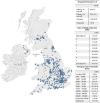COVID-19 in the context of pregnancy, infancy and parenting (CoCoPIP) study: protocol for a longitudinal study of parental mental health, social interactions, physical growth and cognitive development of infants during the pandemic
- PMID: 35667736
- PMCID: PMC9170803
- DOI: 10.1136/bmjopen-2021-053800
COVID-19 in the context of pregnancy, infancy and parenting (CoCoPIP) study: protocol for a longitudinal study of parental mental health, social interactions, physical growth and cognitive development of infants during the pandemic
Abstract
Introduction: While the secondary impact of the COVID-19 pandemic on the psychological well-being of pregnant women and parents has become apparent over the past year, the impact of these changes on early social interactions, physical growth and cognitive development of their infants is unknown, as is the way in which a range of COVID-19-related changes have mediated this impact. This study (CoCoPIP) will investigate: (1) how parent's experiences of the social, medical and financial changes during the pandemic have impacted prenatal and postnatal parental mental health and parent-infant social interaction; and (2) the extent to which these COVID-19-related changes in parental prenatal and postnatal mental health and social interaction are associated with fetal and infant development.
Methods and analysis: The CoCoPIP study is a national online survey initiated in July 2020. This ongoing study (n=1700 families currently enrolled as of 6 May 2021) involves both quantitative and qualitative data being collected across pregnancy and infancy. It is designed to identify the longitudinal impact of the pandemic from pregnancy to 2 years of age as assessed using a range of parent- and self-report measures, with the aim of identifying if stress-associated moderators (ie, loss of income, COVID-19 illness, access to ante/postnatal support) appear to impact parental mental health, and in turn, infant development. In addition, we aim to document individual differences in social and cognitive development in toddlers who were born during restrictions intended to mitigate COVID-19 spread (eg, social distancing, national lockdowns).
Ethics and dissemination: Ethical approval was given by the University of Cambridge, Psychology Research Ethics Committee (PRE.2020.077). Findings will be made available via community engagement, public forums (eg, social media,) and to national (eg, NHS England) and local (Cambridge Universities Hospitals NHS Foundation Trust) healthcare partners. Results will be submitted for publication in peer-reviews journals.
Keywords: COVID-19; Fetal medicine; QUALITATIVE RESEARCH.
© Author(s) (or their employer(s)) 2022. Re-use permitted under CC BY. Published by BMJ.
Conflict of interest statement
Competing interests: None declared.
Figures



References
-
- Stein AD, Ravelli AC, Lumey LH. Famine, third-trimester pregnancy weight gain, and intrauterine growth: the Dutch famine birth cohort study. Hum Biol 1995;67:135–50. - PubMed
Publication types
MeSH terms
Grants and funding
LinkOut - more resources
Full Text Sources
Medical
Miscellaneous
